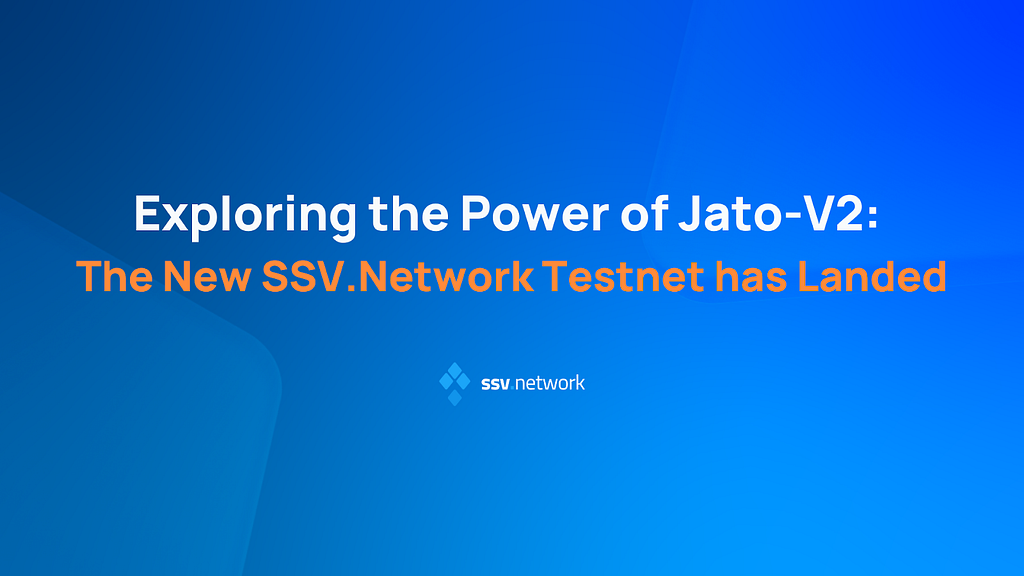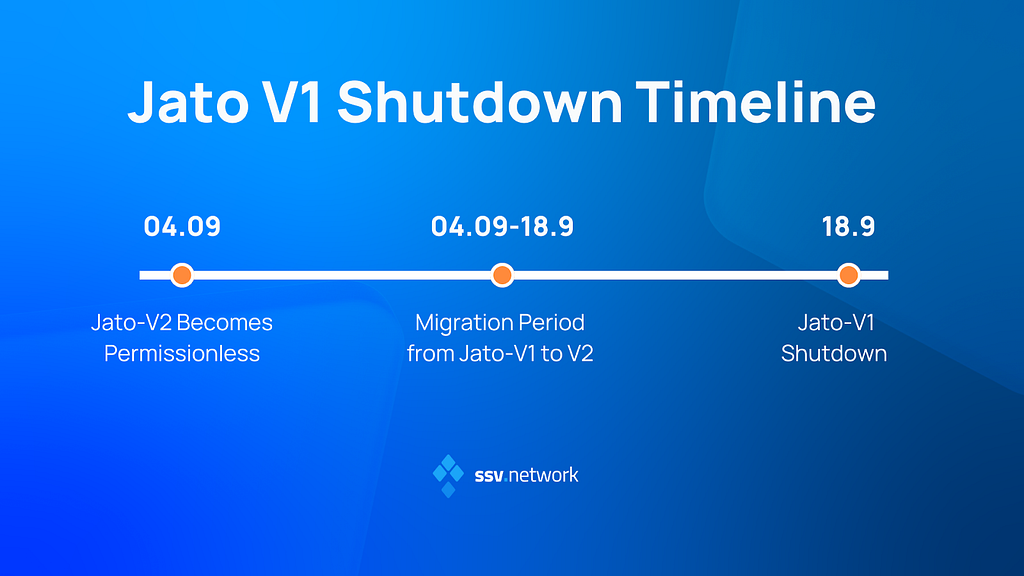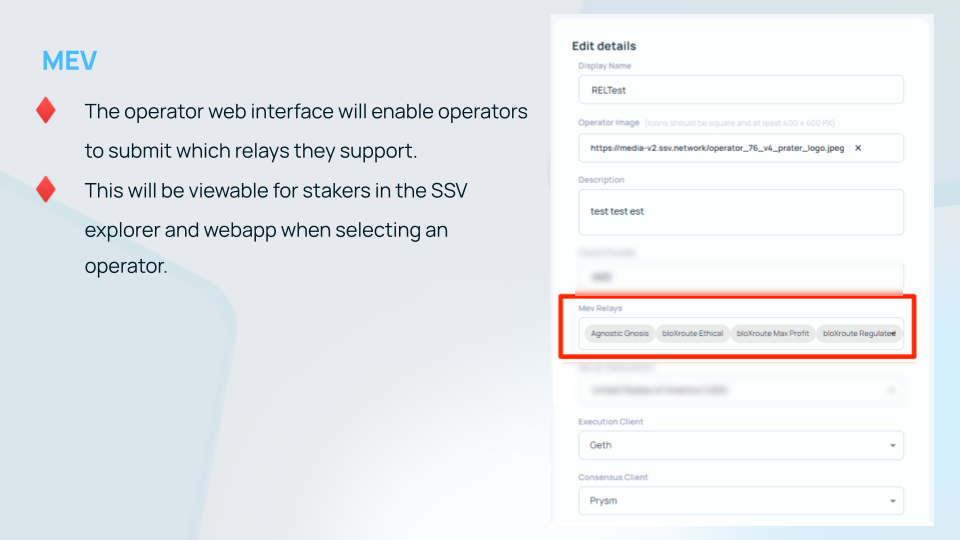Exploring the Power of Jato-V2: The New SSV.Network Testnet has Landed
Explore the features of SSV.Network's Jato-V2 testnet, offering a mainnet-like environment with enhanced security and performance for next-gen staking.

The SSV DAO is excited to announce that Jato-v2 is live and officially open to the public. This testnet is identical to the version currently running on mainnet and opens up the mainnet-like testing environment for everyone to try. This also means the time has come to shut down Jato-v1. This blog post will give you the shutdown timelines, an overview of what’s new in Jato-v2, and important links to docs and migration guides.
TL;DR
While the ssv.network mainnet rollout progresses through Limited Launch, the next phase is steadily approaching. The Launch phase will see the SSV DAO’s launch partner staking applications go live on the protocol, with the verified operators managing their validators. This is the first time a DVT network will be tested at scale on mainnet Ethereum! Don’t miss out, more alpha is coming soon on Mainnet Call #3.
Testing since the beginning of the mainnet rollout, Jato-v2 has emerged as the new official ssv.network testnet. It runs alongside the mainnet and is the same version that has been used in closed testing since Pre-launch. To ensure that each phase of the rollout is thoroughly examined, Jato-v2 was closed to the community, until today.
Now that the protocol is transitioning to the Launch phase, the last phase — Permissionless Launch — is in sight. This means making Jato-v2 available to everyone so they can get a taste before the protocol goes fully permissionless later in Q4.
From the 4th of September, Jato-v2 will become permissionless, meaning anyone can test out the latest implementation of the ssv.network protocol. While testers get acquainted with the new version of the protocol, there will be a migration period of 2 weeks in which all Jato-v1 users should move over to v2. On the 18th of September, Jato-v1 will be shut down.

Optimizing the SSV Node & Spec has enabled an increase in performance and security. Anyone can test out the new features that are currently live on mainnet. The following are updates and features included in the new testnet:
The ssv.network smart contract architecture has changed to an ERC-2535 Diamond Standard to extend contract functionality. This move has empowered the core team to weave greater modularity, scalability, and gas efficiency into the contracts. The standard has been simplified to render it more accessible to the network.
Internal reviews and audits were conducted on the smart contracts during the previous phases. This heralded a few important updates that were implemented, among them frontrunning and replay attack mitigation.
The SSV Node now fully supports MEV and, by extension, validators in the network that want to participate in MEV opportunities. For a deep dive into the integration of MEV in DVT, read the official blog post.
The Operator metadata section has been significantly improved; in Jato-v1, metadata only allowed operators to set their names.
In Jato-v2, operators can use metadata to show more granular information about their individual node setups. This includes execution and consensus client information, geographic location, social links, and MEV relays. It’s important to show information that’s relevant to stakers, so they can gain a deeper understanding of the node operator they wish to choose.

Optimizing the P2P layer and Signature verifications have stimulated the increase in duty execution by 30%. QBFT timeout liveness improvements made in SIP-10 were major contributors in this area.
Three new bootnodes have been added to the stack thanks to SSV community-led initiatives. These boot nodes enable further redundancy for discovery between SSV nodes, improving decentralization and robustness.
For the Devs and anyone interested in SSV tech, please have a look at our updated Dev-center for resources, tools, and documentation.
Existing users
New users
Directly register validators on Jato-V2 testnet.
With MEV finally enabled in jato-v2, stakers would want to maximize MEV relay correlation among their cluster operator, so make sure to consider supported MEV relays showcased in Operator metadata when creating a new cluster.
The jato-v2 testnet leverages a new set of smart contracts (marked as v4), with updates and breaking changes (learn more).
New version of developer tools and the SDK have also been released, please make sure to update:
Important note: During the migration period, Jato-v2 will have a distinct URL. Once Jato-v1 is shut down, the apps will use the original URL.
While Jato-v1 is live, the link for Jato-v2 web app will stay — beta.app.ssv.network. After the shutdown, it will become — app.ssv.network. This means that the URL for both the testnet and mainnet web app will be app.ssv.network. Users will be able to switch the network from mainnet to goerli in the top bar.
For the Jato-v2 testnet explorer the link will become goerli.explorer.ssv.network after the shutdown.
Links for the mainnet version of ssv.network will be Mainnet web app — app.ssv.network & Mainnet explorer — explorer.ssv.network.
The SSV DAO announces the launch of Jato-V2, the official SSV.Network testnet. This testnet mirrors the mainnet, providing a realistic testing environment. Learn about timelines, what’s new in Jato-V2, and migration guides as Jato-V1 prepares to shut down. Get ready for the Launch phase and discover the future of staking.
Website | Network Hub | Discord | Dev Center | Documentation | GitHub